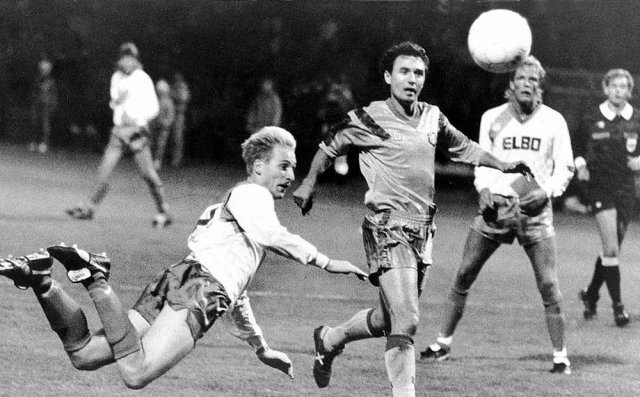A Rostock myth: Michael Spies with his header for the winning goal. Barca defender Ricardo Serna (M.) and Olaf Bodden watch spellbound.
Photo: imago/Rainer Schulz
As we say goodbye, the floodlights shine brightly before Christmas. In terms of sport, 1. FC Union Berlin won’t take much away from the European football circus, but they will get plenty of money, honor and, above all, this one last group game on Tuesday. Real Madrid! This name shines, from the self-imposed exile in the Olympic Stadium to Köpenick and beyond. It is the first time in 32 years that a world football power plays a guest role against a team from the former GDR in the most important of all club competitions. Yes, RB Leipzig has also had memorable evenings in the converted central stadium, against Paris Saint-Germain, Manchester City and Real Madrid. But unlike Union, the Saxon brewing professionals have no tradition of football from the defunct workers’ and farmers’ power.
Circus Europe

Photo: Private
Previously simply the national champions’ cup, today the Champions League: a staged spectacle and football’s money-printing machine. Sven Goldmann looks ahead to the coming matchday.
When FC Barcelona came to East Germany in October 1991 with world stars Michael Laudrup, Hristo Stoitschkow, Ronald Koeman and the young Pep Guardiola, the football world looked a little different. It was the last game of the European Cup, which was reinvented a year later as the Champions League. As the last champion of the GDR Oberliga, Hansa Rostock qualified for the Bundesliga and also secured a place on the biggest stage of all. The Rostock team started the season in the GDR and ended it in the Federal Republic after it was dissolved. They started as champions of the Oberliga Nordost, which still exists today, but only in name: in the two-tier fifth division with league leaders called Hertha Zehlendorf and VFC Plauen.
Hansa Rostock was a big number at the start of the first all-German season. With the recommendation of three wins in the first three games against Nuremberg, Bayern and Dortmund, the newcomer traveled to the Camp Nou as Bundesliga leader for the first leg of the first round of the European Cup. Coach Uwe Reinders cheekily announced a 2-0 win, but Hansa was further away from that than they are from the Champions League today. Pep Guardiola was just 20 at the time. He still had his hair full and played in defensive midfield in his first European Cup game, as the place in the dugout had been given to club saint Johan Cruyff. Guardiola didn’t stand out against Hansa, unlike Michael Laudrup, who scored two goals, the third from Rostock through Jens Dowe himself.
This 0:3 dampened the anticipation for the second leg a little, but that didn’t stop Hansa’s board from asking for ticket prices of up to 100 German marks. Purchasing power in Mecklenburg-Western Pomerania was not so good in the post-reunification period, and advance sales were correspondingly poor. On the day of the match, Hansa reduced the prices by 50 percent, but by then it was already too late. 8,500 spectators were lost in the Ostseestadion. This time Uwe Reinders defined his goals a little more modestly and hoped for an honorable farewell. This was also successful because Barcelona were primarily concerned about making the journey home without injury. It took a timid half-time before the Rostock team noticed that something was happening. After a good hour, Michael Spies scored with a spectacular diving header to make it 1-0.
Barcelona also eliminated the German champions (West) from Kaiserslautern in the second round and went on to the final. At London’s Wembley Stadium, Ronald Koeman scored the goal to make it 1-0 over Sampdoria Genoa. Four days after Hansa was relegated from the Bundesliga.
Subscribe to the “nd”

Being left is complicated.
We keep track!
With our digital promotional subscription you can read all issues of »nd« digitally (nd.App or nd.Epaper) for little money at home or on the go.
Subscribe now!
judi bola online judi bola sbobetsbobet88judi bola sbobet
